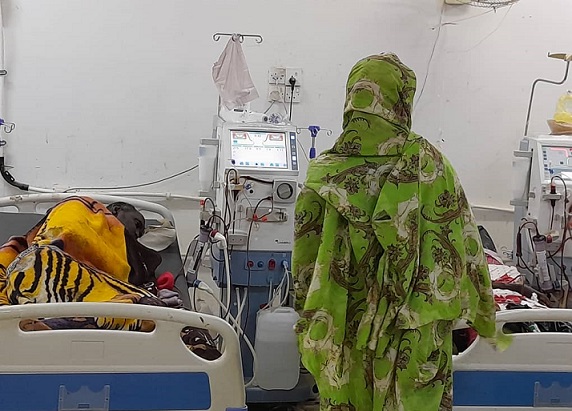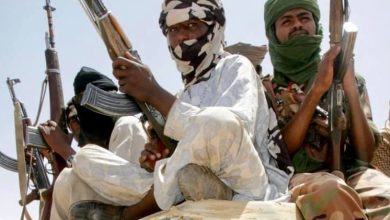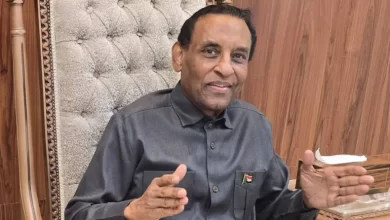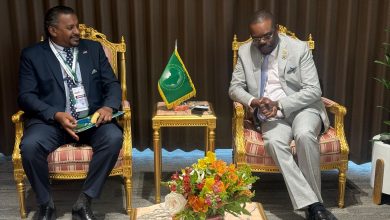Kidney Patients in Khartoum… Continuation of War Exacerbates their Suffering

Sudan Events – Agencies
Hajja Fatima died in Imtidad (3) in Khartoum after her family failed to find a dialysis center. Yaqoub’s condition deteriorated after diabetes and kidney problems weakened him, so his leg was amputated during his exodus from Omdurman to the city of Wad Medani and Gedaref in search of a dialysis center.
The presence of volunteers and resistance committees in the capital has relatively alleviated the suffering of patients, and their presence has been a lifeline for many, as they have contributed through initiatives to providing some aids to patients in light of the difficulty of sending government aids.
Statistics
According to previous statistics from the Sudanese Ministry of Health last year, the number of kidney centers and specialized units in hospitals that were operating three months after the war was estimated at (23) out of a total of 105 centers in the country, noting that the number of patients in Sudan reached 8 thousand patients.
However, sources explained to Al-Tagheer that the mentioned number of operating centers decreased significantly with the closure of most of the centers in Bahri and Khartoum, except for Bashaer and Al-Turki in Kalakla and Jebal Awliya, while the city of Omdurman includes the largest number of operating centers in the capital, Khartoum.
Problems
Etemad, the sister of the late Fatima, summed up their suffering in simple words, saying: My sister suffered from kidney problems five years ago, and before the war, she used to perform dialysis operations at the Academic Hospital in Imtidad, and sometimes in some private centers in Khartoum.
In her interview with Al-Taghyeer, Etemad pointed out that all the centers stopped after the war, saying: We began the journey of searching for a dialysis center, and we learned that the Bashaer “Mayo unit” was working. We arrived there after great suffering and risks and found a large group of patients waiting for their turn for treatment.
She said: We became aware of the difficulty of the situation due to the large number of patients versus a small number of machines and aids, so we decided to travel to the city of Rabak in the White Nile, but my sister died before traveling.
Failure:
Mohammad Ahmed Saeed’s luck was not better than that of Haja Fatima, as he failed to get three dialyses at the Bashaer Center in “Mayo”. His son, Osman, told Al-Tagheer: My father’s health condition is deteriorating and he needs three dialysis a week, according to doctors, but in light of the war, it decreased to two dialyses, then one dialysis.
He added: We found a house near Bashaer Hospital in Mayo, but treatment failed. Now the treatment has stopped or almost stopped. Sometimes we find it, and most of the time we return without dialysis due to the lack of aids, water and electricity.
Deterioration
(N, A), a volunteer at the Solidarity Center on the Gezira Eslang in Omdurman, preferred to to be identified of fear.
(N) tells Al-Tagheer that the center has 70 patients who receive dialysis treatment on a regular basis. The center had only 9 working machines, but they were always exposed to very many malfunctions and there were no spark plugs. We have two broken machines now, bringing the number of machines to only (7)
She added: Before the war, we did not suffer like other centers regarding dialysis supplies, for example, dialysis machines and belts are provided by the Ministry of Health only.
Shortage
N. continues her speech: For months, we suffered from a shortage of saline, D-5, plaster and gauze, in addition to cotton and IOT, as well as heparin and Librex injections that stimulate blood production. The latter is very important, as sometimes patients’ blood stops after dialysis, so these injections are used. We buy, as volunteers, funds from charitable donations, even gloves, vitamins, folic acetate, and blood pressure pills.
Obsession
According to (N), Librex injections constitute their greatest concern as volunteers and for patients due to their high prices and lack thereof, the price of one injection being (15) thousand pounds. Note that the patient needs two injections per week after each wash, and of course patients cannot afford this injection, as failure to use it causes a blood shortage of (30%-40%) in most cases, and from my observation that 50% of these patients receive blood from donors.
Poverty
(N) said: There is also a shortage and scarcity of consumables, which forces patients to buy them from abroad. The price of astringents is two thousand pounds, one pill of hebrin is three thousand pounds, and plasters are two thousand pounds, and even injections are purchased. Sometimes there are no solutions such as citric and acid, so the patient buys all these needs from abroad.
She says: Based on my presence in the center, I can confirm that (99%) of the patients do not even have the right to food, let alone treatment. They pay the price with their health and sometimes lose their lives.
Blackmail
)N) confirmed that the Rapid Support Forces (RSF)are selling some supplies to patients in the areas under their control, such as acid, at a price of 40 thousand pounds, enough for one wash.
Deaths
(N) points out that the war caused the number of dialyses for patients to be reduced from two to one, which negatively affected the health of patients by increasing toxins in the body, confirming that many deaths occurred because of this matter.
She explained that some patients obtain supplies through special methods, and the center’s management does the dialysis.
Patients’ tragedies
She says that some patients were displaced due to the lack of supplies and suffering in dialysis, and some of them died on the way, like Uncle Yaqoub, who was displaced to Medani before the Rapid Support (RSF) entered the city so that he could complete three dialyses instead of two, and after the Rapid Support Forces (RSF) entered there, he was forced to flee again to Kassala, then Gedaref, and from there to Atbara. There, his health condition deteriorated because he had diabetes, so doctors had to amputate his leg above the knee joint.
Temporary relief
N. concludes her testimony by confirming that there has been a relief, which she describes as temporary, saying: The situation now has somewhat improved, but the impact of the past months on patients has been great.
She adds: Recently, we obtained supplies for two dialysis machines, but we still suffer from a lack of consumables. We took an initiative to provide these needs, and indeed they succeeded, and patients began to depend on them greatly.
She said: The staff working at the center have not been paid salaries since the start of the war, but they perform their duty with full dedication and sincerity.
Disaster
For its part, the East Nile Emergency Room revealed the death of six kidney failure patients due to the lack of water and electricity in the locality.
The Chamber described the continued power and water outages as a real disaster that requires urgent intervention, as the lack of water has exacerbated the suffering and caused severe crises in all aspects of human life, especially for kidney patients.
Malfunctions
The emergency room confirmed that the lack of water and the high price of fuel disrupted the work of the centers, and the health and medical authorities were unable to operate the centers and provide dialysis treatment to patients effectively, as sessions were reduced and necessary dialysis operations were stopped in the past days, causing the death of six patients from the beginning of the crisis until Now in the dialysis center at Alban Jadeed Hospital.
The Emergency Committee explained that hundreds of kidney failure patients in the region and neighboring areas face the same risks, indicating that the Chamber is working hard to reduce these risks.
A Call
The emergency room launched an appeal to all national and international organizations and all donors to contribute to purchasing fuel to operate water pumping stations and provide solar panels to help hospitals generate electricity and health centers.
Water cuts
The areas south of Khartoum are suffering from water and electricity outages, which has affected all services, especially health services.
Costs
Member of the South Belt Emergency Room, Muhammad Ibrahim, described the water shortage crisis as catastrophic for kidney patients.
Ibrahim revealed to Al-Taghyeer that the cost of dialysis had risen to 15,000 pounds per dialysis, noting that dialysis was originally free, but with the war conditions, the cost had risen in light of the scarcity of aids, pointing out that the Bashaer Center is the only center that serves the areas southeast of the capital.
Water cost
Ibrahim explained that the patients and their families are bearing more than they can bear, as the conditions of the water outage forced them to bear the costs of transporting water to the center in Dafar (a big truck), at a rate of (80) thousand per day, shared by the owners of the sessions. It is expected that dialysis costs will increase to exceed the 100,000 barrier with the continued water outage and the increase in the price of gas for water transportation.
He said: In light of these complex economic conditions, a dialysis session for kidney patients becomes an unattainable dream.
Appeal
The South Belt Emergency Room appealed to all citizens and local and international humanitarian organizations to support the dialysis center to ease the burden of the disaster on patients.
Electronic platform
Acting Federal Minister of Health, Haitham Mohamed Ibrahim, confirmed during a meeting with the Director of the National Center for Kidney Diseases and Surgery, Nizar Zalfo, the provision of a large amount of supplies and medicines for patients in hospitals and operating centers, including those under the control of Rapid Support.
The meeting revealed an electronic platform to communicate with patients and centers to know their needs.



